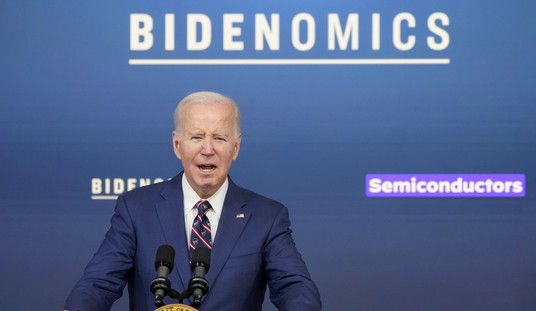Wikipedia defines the idea of final protective fire as “the last resort in defensive plans, normally involving artillery and/or heavy machine gun fire directed dangerously close to friendly defensive positions that are at risk of being overrun by the enemy. A request for final protective fire generally has absolute priority over any other kind of requests.” In political terms this probably equates to mobilizing one’s base at whatever cost to prevent a complete rout by the other side. Andrew Kaspar argues that “the Democrats’ goal, in short, is to rouse the left to save their Asses.” And the Left’s get-out-the-vote campaign has been “unprecedented.”
At a late September fundraiser, Vice President Joe Biden instructed Democratic activists to “remind our base constituency to stop whining and get out there and look at the alternatives. This President has done an incredible job. He’s kept his promises.”
The alternative to the Left is “giving up their gains.” And that they will not do. Convinced that the American voter was recoiling from Obama from a combination of bigotry, fear and ignorance, the Left is determined to gain the commanding heights by a sheer effort of will.
With healthcare, financial reform and an occasionally contentious primary season behind them, Laura Bonham, co-founder and deputy director of Progressive Democrats of America (PDA), is confident that PDA’s 85,000 members will be voting on November 2, regardless of whether or not they are “enthusiastic” about doing so. For her, the question is simple and the alternative unthinkable.
“As we’re taking these small steps—but they are steps—in the right direction, do we want to just go back two years and forget what happened before Obama got elected? We can’t forget what happened before Obama got elected,” Bonham says. “That’s the choice you’re making: going back or going forward.”
Jay Cost noted that the president explicitly compared the electoral unease with his policies to unreasoning superstition. It is fear — fear stoked by conservative hatemongers — that is preventing the electorate from realizing how grateful they should be to the program of Hope and Change. The president said:
“Part of the reason that our politics seems so tough right now and facts and science and argument does not seem to be winning the day all the time is because we’re hardwired not to always think clearly when we’re scared,” Obama said Saturday evening in remarks at a small Democratic fundraiser Saturday evening. “And the country’s scared.”
And when the president is right and the voters are wrong, then the obvious strategy is to make the electorate take what they don’t want because it’s good for them. That translates to sending highly motivated waves of voters forward to carry the political day by sheer will. Mickey Kaus, writing in Newsweek, says the plan is exactly that: “It’s vulgar economic determinism: When people are afraid for their economic livelihood they do foolish things, like clinging to their guns and God or, in this case, voting in opposition to Obama’s presidency. When they feel more secure, they’ll come around.”
One indicator of the faith in this economic determinism is the frequent juxtaposition of the phrase “unexpectedly declines” in economic news. For example, ABC News says “U.S. industrial production unexpectedly fell in September.” Bloomberg reports that “confidence among U.S. consumers unexpectedly declined in October, with Americans more pessimistic about current economic conditions.” It is a reminder that there is a substantial constituency for the models which claim that the economy ought to be getting better. Each day the doctor tells the patient, who feels daily worse, that a little more leechcraft and the recovery will be complete. In their view it is patient ignorance not iatrogenesis that is the explanation for the gap in perceptions. Mickey Kaus says that while it isn’t impossible to argue that Obama might prove correct, it runs counter to experience so far. “What if he’s right? In two years, the economy will have recovered and voters will feel better about his policies.” The chances are that the president is wrong.
It’s one thing to say those poor people in Pennsylvania are hostile to gay rights, say, because all their “jobs have been gone now for 25 years and nothing’s replaced them”—and that they’ll change when they get the jobs back. It’s another thing to say those poor people will change when they get their jobs back when you’ve had two years to get them their jobs back and have conspicuously failed. At that point, blaming “false consciousness” becomes a semi-delusional way of dancing around your own inability to remove the root of that false consciousness. A little humility is in order. If true humility is unavailable, false humility will do.
But so what if he’s wrong. From one point of view, being wrong, even wrecking the economy, is not half as bad as giving up a vision that has become an end in itself. What Mickey Kaus and Jay Cost may have failed to realize is that maybe President Obama isn’t trying to win independents over by convincing them they were suffering from “false consciousness”; he is energizing his leftist base, reminding them that this was not the time to go wobbly. Far from being a “teaching moment” by the great guru to the dull and leaden masses, it is a call to action by the initiates who alone, or nearly alone among the voters, understand that war is peace, freedom is slavery, and ignorance is strength. In short, that the opposite is somehow the truth.
Kaus argues that in electoral terms, rallying the troops around the long-term vision doesn’t make sense. Why has the president, faced with a revolt from the middle, decided to go left? Tactically because the middle was lost to the president months ago; perhaps his strategists have given up hope of recovering them in the short time left before the polls. Maybe they think there is more to gain by going hard left and mobilizing the faithful than by trying to attract moderate voters who are beyond reach now anyway. By energizing the true believers it may be possible to limit the extent of the Republican gains. Going on the defense often means shortening lines. At least, it is a kind of Final Protective Fire.
There are strategic arguments for going hard left also. By ramping up rhetoric and emphasizing the contradictions between the party faithful and the dull proletariat, President Obama may have calculated that a program of “better fewer, but better” holds the best hope for longer-term advance. The Democratic Party will be devastated in November. This creates an opportunity for the Left within it, because they more than others are likely to hold fast within its walls. Although it may be entirely coincidental, the failure of Hope and Change is reminiscent of the immense failures in Lenin’s programs which by the early 1920s had forced him to scale back his ambitions. As Marxist.com recalls:
In 1921, under the pressure of the millions of peasant small proprietors, the workers’ state had been forced to retreat from the path of Socialist planning and industrialisation, in order to procure grain for the starving workers in the cities. The old Civil War practice of requisitioning grain had to be abandoned to placate the peasants, whose support was necessary if the workers’ state was not to succumb to the reaction. A free market in grain was re-established, and concessions were made to the peasants and small traders, while the main levers of economic power (nationalised banks and heavy industries, state monopoly of foreign trade) remained in the hands of the workers’ state.
This retreat which had been forced upon the Bolsheviks was not to create a Socialist, classless society but to save millions from starving to death, to re-build a shattered economy and to provide houses and elementary schools – i.e. to drag Russia into the twentieth century.
Although apparently forced to give ground on the economy, Lenin considered it a mere expedient. His long-term answer to the problem of “false consciousness” was to create a cadre of motivated fanatics who would persist until the long-term goals had been achieved. As Lenin put it:
We have been bustling for five years trying to improve our state apparatus, but it has been mere bustle, which has proved useless in these five years, of even futile, or even harmful. This bustle created the impression that we were doing something, but in effect it was only clogging up our institutions and our brains.
It is high time things were changed.
We must follow the rule: Better fewer, but better. We must follow the rule: Better get good human material in two or even three years than work in haste without hope of getting any at all.
I know that it will be hard to keep to this rule and apply it under our conditions. I know that the opposite rule will force its way through a thousand loopholes. I know that enormous resistance will have to be put up, that devilish persistence will be required, that in the first few years at least work in this field will be hellishly hard. Nevertheless, I am convinced that only by such effort shall we be able to achieve our aim; and that only by achieving this aim shall we create a republic that is really worthy of the name of Soviet, socialist, and so on, and so forth.
“Better fewer, but better” is a strategy that has either allowed elite parties to survive in lean times or condemned them to marginalization. Which it will be depends on how things turn out.










Join the conversation as a VIP Member